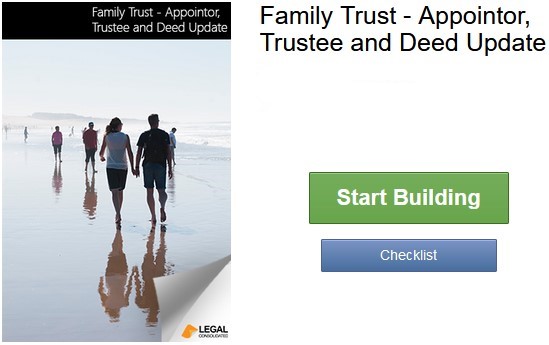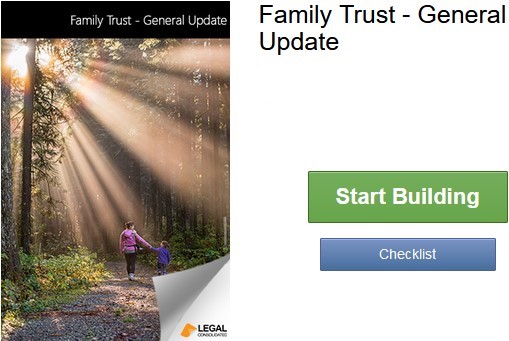 Family Trust succession planning
Family Trust succession planning
Many assets do not go into your Will at death.
These assets do not go into your Will:
- Joint tenancy
- Superannuation (unless you have a binding nomination)
- Cross-owned insurance
- Family Trust assets (except for loan accounts and Unpaid Present Entitlements).
My doctoral thesis was on succession planning, succession planning for the Family Trust is the most challenging.
Who controls the Family Trust if the Appointor loses mental capacity?
See this article as to what happens when an Appointor dies.
However, what happens if the Appointor does not die but becomes of unsound mind? When you become of unsound mind you no longer can make decisions. You can no longer perform the job of being the Appointor.
Family Trusts are flexible but not for succession planning
We all love family trusts. They are flexible. Every year you hunt down family members with the lowest marginal tax rates. Watch the law firm’s free training course on Family Trusts here.
Family Trusts are ‘discretionary’. The Appointor (god) tells the Trustee who gets the income each year. Other people in a Family Trust such as:
- Trustee
- Corporate Trustee (company) and the director of that company
- Default beneficiaries; and
- General beneficiaries
have little say in the discretionary trust. The Appointor is the one in control. The appointor is god.
The key roles in the trust deed are:
- the trustee, with the day-to-day control; and (servant of the Appointor)
- the appointor (the god) hires and fires the trustee
Usually Mum and Dad start as the Appointors of their Family Trust. They appoint their children as the Backup Appointors. When Mum and Dad die the Backup Appointors take over automatically. If the children do like like the Trustee they sack the Trustee.
The Appointor is where succession planning starts and ends for a Family Trust.
Appointors only act unanimously
The Appointor is the key controller in the discretionary trust. This may not be appropriate for the next generation. Who is appropriate to have the power to control the trustee? Can that role be a joint role? If so, do decisions have to be unanimous or just a majority vote? Or could a new company be the Appointor? If so, who are the directors and shareholders of that new company? Do you need a shareholders agreement?
have the power to control the trustee? Can that role be a joint role? If so, do decisions have to be unanimous or just a majority vote? Or could a new company be the Appointor? If so, who are the directors and shareholders of that new company? Do you need a shareholders agreement?
A good Family Trust deed makes the Appointors act unanimously. There is no other way. Otherwise, your two daughters will gang up on your son and take 100% of the Trust’s assets. Control is an absolute concept. It cannot be fractionally divided between the next controllers.
Should your Family Trust end at your death?
At death, there are a number of death taxes.
There are many tax exemptions as well. There is generally a ‘rollover’ of CGT and transfer (stamp) duty. Therefore, there is generally neither tax when the assets go from the dead person to the executor and then to the beneficiary. But this does nothing to help the Family Trust. Family Trust assets do not belong to the deceased estate.
When you die nothing happens to the Family Trust. An Appointors death does not wind up or affect the trust.
If your children are the Appointors they still can’t take the assets out of the Family Trust. If they do they trigger Captial Gains Tax.
To see the succession planning of the Appointor see clause 6 in our Legal Consolidated Family Trust Deed. You can see our Family Trust Deed Sample here for free.
Clause 6 in our Family Trust deed addresses 9 issues – all of them are about the Appointor and succession:
- More than one child?
- Relinquish position?
- Fetter discretion?
- Change the Trust Deed?
- Verbal decisions ok?
- Change Backup Appointors?
- Automatically remove Appointors?
- Sole surviving Appointor dies or goes bankrupt?
- Children minors when you die?
What happens if the Appointor loses mental capacity or goes bankrupt?
Legal Consolidated provides guidance on scenarios where an appointor of a Family Trust goes insane or becomes bankrupt:
-
Insanity of Appointor: In a Legal Consolidated Family Trust the appointor is removed. The remaining Appointor or Appointors continue to act. And if none then the Backup Appointors take over.
-
Bankruptcy of Appointor: In the event of bankruptcy, the role of the appointor is safeguarded from being seized by a trustee-in-bankruptcy. The power to control the trust, being a fiduciary obligation, is not considered a part of the bankrupt’s estate. This distinction means that despite personal financial distress, the appointor’s control over the trust remains unaffected by their bankruptcy status. It’s crucial for the trust deed to clearly define these roles and scenarios to prevent any takeover by the trustee-in-bankruptcy. As with insanity the other Appointors or the Backup Appointors take over.
Legal Consolidated Family Trust Deeds remove the Appointor automatically if the Appointor loses mental capacity or goes bankrupt
Family trusts are vital tools for asset protection, tax planning, and estate management. However, the role of an appointor—the individual with ultimate control over the trust—can be fraught with legal complexities, especially when they face personal challenges such as loss of mental capacity or bankruptcy. Legal Consolidated Barristers & Solicitors, a leader in online legal document provision, offers a robust solution with our tried and tested innovative family trust deeds.
Automatic Removal of Appointors: A Unique Feature
Legal Consolidated’s Family Trust Deeds stands out by incorporating clauses that automatically remove an appointor who either goes bankrupt or loses mental capacity. This proactive feature is crucial for maintaining the integrity and functionality of the trust under challenging circumstances. The automatic removal clause ensures that the trust is not compromised by the personal issues of the appointor.
Why Automatic Removal of a Family Trust Appointor is Necessary
The role of an appointor is pivotal, holding the power to appoint or remove trustees and make significant decisions affecting the trust’s administration. If an appointor loses mental capacity, they can no longer fulfil their duties effectively, potentially leading to mismanagement of the trust. Similarly, if an appointor goes bankrupt, their creditors might attempt to seize control of the trust, risking the beneficiaries’ assets. The automatic removal clause prevents such scenarios by ensuring that the appointor’s vulnerabilities do not spill over into the trust management.
Legal Protection and Continuity if the Appointor goes crazy or bankrupt
By including an automatic removal provision, Legal Consolidated ensures that a trust can operate without interruption. This clause not only protects the trust’s assets from external threats but also facilitates a smoother transition of control, allowing for a backup appointor or successor to take over promptly and efficiently.
Legal Consolidated’s approach to drafting Family Trust Deeds with the inclusion of automatic removal clauses for appointors facing bankruptcy or loss of mental capacity reflects a deep understanding of trust law and foresight in trust management. This feature is an example of how tailored legal solutions can provide robust protections for trust assets and ensure seamless continuity in trust operations, safeguarding the interests of all beneficiaries.
For anyone establishing a family trust, considering such innovative clauses in the trust deed can be a wise decision, ensuring that the trust remains a reliable and effective tool for asset management, regardless of the personal circumstances of those in control.
What if the insane Appointor is also a trustee or a director of a corporate trustee of the family trust?
If the trustee company or human trustee gets into trouble the Appointor merely sacks that person. However, what happens if the Appointor is also the Trustee or a director of the Family Trust’s corporate trustee?
If you follow the woman of substance and man of straw asset protection strategy then the wife owns the shares in the company and merely calls a general meeting and removes her mentally challenged husband as a director. It is the shareholders that hire and fire the directors. The Appointor hires and fires the Trustee.
Before the appointor is crazy can he appoint extra directors to the corporate trustee of the family trust?
What would be the value? The trustee (being the company, not the directors) takes its marching orders from the Appointor. If the Appointor is of unsound mind then you need to read the terms of the Family Trust Deed. Legal Consolidated has the other Appointors acting, if any. If there is no other Appointor then the the Backup Appointors take over and can then direct the corporate trustee. No one cares who the directors are of the corporate trustee.
However, if the Family Trust Deed is silent then you need to go to the Supreme Court and ask them to make a ruling as to what happens. That is expensive and time-consuming.
Can crazy people be directors of a corporate trustee of a Family Trust?
A person of unsound mind can not be a director of a company or in this case a director of a company that is performing the duty of being a trustee of a family trust. To be a director you must be at least 18, of sound mind and not bankrupt.
They must be removed and this happens via the shareholders. If the shareholder is an insane person, then the person holding a Legal Consolidated Enduring POA can stand in the shareholder’s shoes and sack the director and put in a new director. However, that does not help if there is no Appointor in place, as the corporate trustee must act as directed by the Appointor.
Is the Appointor of the Family Trust really of unsound mind?
Why do you say that the Appointor or director of a company is of unsound mind? Lawyers, accountants, financial planners and medical doctors do not make that ruling. A judge in a court law will tell you if you are of sound mind. You are deemed to be sound mind.
In Gibbons v Wright [1954] HCA 17 the High Court helps us understand who can sign a contract:
“The law does not prescribe any fixed standard of sanity as requisite for the validity of all transactions. It requires, in relation to each particular matter or piece of business transacted, that each party shall have such soundness of mind as to be capable of understanding the general nature of what he [or she] is doing by his [or her] participation.”
The NSW Supreme Court states that a person cannot be deemed incapable of managing their own affairs unless, at a minimum, it is evident that:
“(a) that he or she appears incapable of dealing in a reasonably competent fashion with the ordinary routine affairs of man; and
(b) that by reason of that lack of competence there is shown to be a real risk that either;
(i) he or she may be disadvantaged in the conduct of such affairs, or
(ii) that such monies or property which he or she shall possess may be dissipated or lost; it is not sufficient merely to demonstrate that the person lacks the higher level of ability needed to deal with complicated transactions or that he or she does not deal with even simple or routine transactions in the most efficient manner.
The ordinary affairs of mankind do not just mean being able to go to the bank and draw out housekeeping money. Most people’s affairs are more complicated than that, and the ordinary affairs of mankind involve at least planning for the future, working out how one will feed oneself and one’s family, and how one is going to generate income and look after capital. Accordingly, whilst one does not have to be a person who is capable of managing complex financial affairs, one has to go beyond just managing household bills.
The relevant time for considering whether a person is incapable of managing his or her affairs is not merely the day of hearing, but the reasonably foreseeable future.
Two further factors are relevant when determining whether a person is ‘incapable of managing their affairs’.
The first is whether or not the person is willing to seek and take appropriate advice. In general, taking advice can “remove the risk that the lack of the abilities will cause the person to be disadvantaged in the conduct of his or her affairs.”
The second is whether the person has the ability to identify and deal appropriately with those who may be attempting to benefit from their assets through unfair dealing. In regards to Justice Powell’s classic formulation, this factor is relevant since the skill to identify and deal appropriately with exploitation is necessary to carry out the ‘ordinary routine affairs of mankind.’ The lack of this skill may create a real risk that the person may be disadvantaged or that their estate may be dissipated or lost.”
Can a person with dementia continue to act as an Appointor of a Family Trust?
Potentially they can. It depends on the level of incapacity.
A person with dementia may still be able to serve as an Appointor of a Family Trust if their cognitive abilities allow them to understand and execute the responsibilities of the role. This depends heavily on the specifics of their condition and the legal stipulations outlined in the trust deed. The role of the Appointor is significant as it involves the authority to make critical decisions regarding the trusteeship and overall management of the trust. If the dementia impacts their decision-making skills, this could lead to mismanagement and potential legal disputes.
In the case of a company director with mental incapacity, it is usually advisable for them not to continue their duties if their condition affects their decision-making abilities. This is because directors must adhere to legal responsibilities that require sound judgment. An inability to meet these duties due to mental health issues could not only put the business at risk but also lead to legal consequences for the director.
| Deeds of Variation for Family Trust – build online | |
|---|---|
| 1. Everything – Deed, Appointor & Trustee (recommended) – includes succession planning |
|
| 2. Upgrade Family Trust’s Deed – streaming, Bamford, trust law & tax |
|
| 3. Updates the Appointors – includes succession planning |
|
| 4. Replaces the Trustee of the Family Trust |
|
| 5. Change Name of the Family Trust | |
| 6. Exclude a Beneficiary in the Family Trust | |
| 7. Exclude Foreigners in the Family Trust |